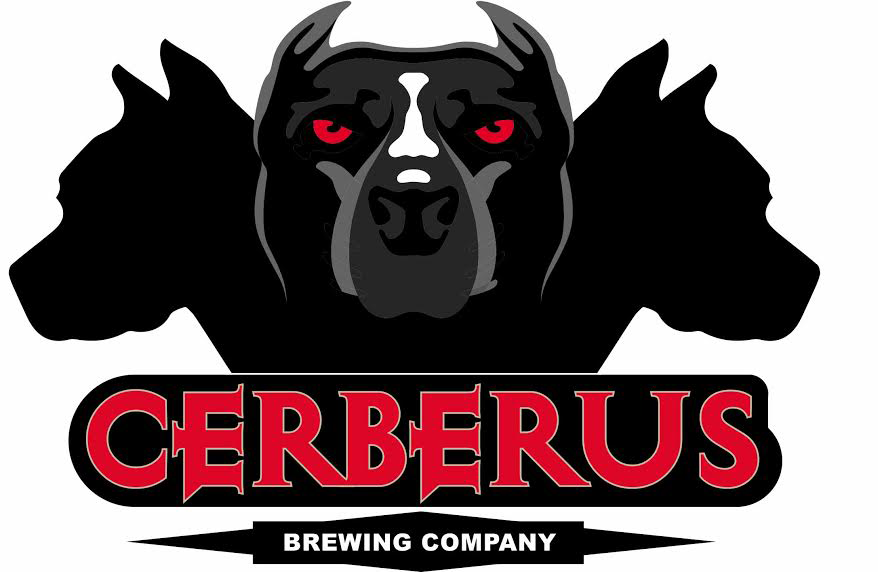Piglatin Cocina began soft openings in late January, inside an unassuming strip center at Dublin Road and North Union in Northeastern Colorado Springs, Colorado. Their loyal following has anxiously been waiting for the brick and mortar location to appear since the treasured Piglatin Food Truck, featured on Food Network, closed in late summer of 2017. The mobile kitchen quickly became a local favorite, outgrowing their wheels in less than four years and successfully capturing the hearts and bellies of patrons hungry for an affordable and delicious approach to Latin cuisine.
“The model for Piglatin Cocina is ‘Food for the People,’” says Andres Velez, owner and chef at Piglatin Cocina. “Making good food at a reasonable cost. Offering hard-working people a unique, exceptional experience.”

As we step through the inconspicuous door to Piglatin it transports us into a hip, Brooklyn-based carniceria. The space feels transcendent and gives us an expansive tour of numerous Latin food and beverage traditions.
“Food is a history lesson,” says Velez. “I love food because it’s both time traveling and traveling. It’s like, ‘I remember this when I was five years old eating in Colombia at my grandma’s house.’ It’s not just ‘oh, this tastes good.’ It brings back memories and different feelings all at the same time.”
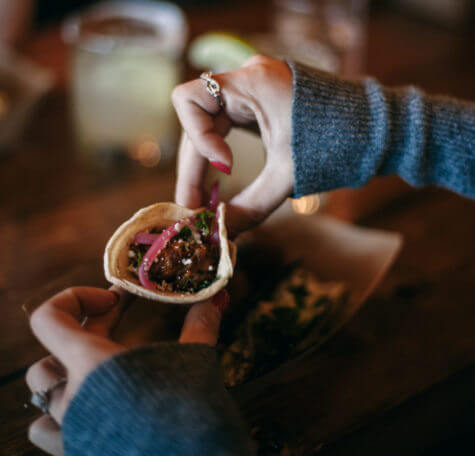
We take a quick glance at the cocktail list and kick things off with a Hibiscus in Jamaica, Pisco mule and coquito. The Hibiscus in Jamaica leads as refreshing and light, with layers of floral and tropical flavors that don’t translate as overly perfumy or sweet.
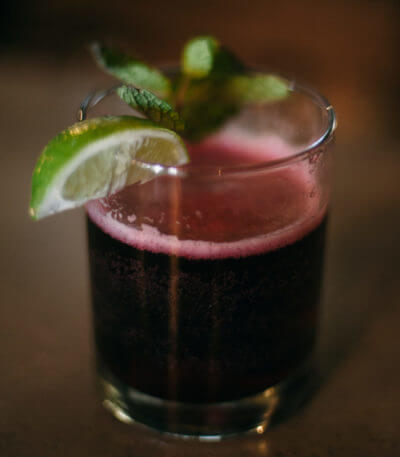
The Pisco mule is served in a low-ball glass, rather than a copper mug, which doesn’t detract any elements from the drink that elicits aromatic and zesty qualities. Pisco is a high-proof spirit made by distilling fermented grape juice with production predominantly in Peru and Chile.
The coquito, a Puerto Rican cocktail which we liken to a “Latin American White Russian,” is made of rum, cream and a generous dash of cinnamon. It captures the essence of a warm night on the colonial streets of Old San Juan with structural similarities to horchata.

Velez shares that his parents immigrated from Bogota, Colombia, to Union City, New Jersey, one of the most densely populated areas in the United States. Velez describes growing up in “a melting pot of Latin American culture with people whose roots are from Cuba, the Dominican Republic, Puerto Rico and Ecuador.” He indicates that his Colombian heritage, the eclectic and robust environment of his youth and a misfortunate incident all contribute to the inspiration behind Piglatin’s menu.
“My mom, when we were growing up, was in a car accident,” says Velez poignantly. “She couldn’t cook for six months so I started watching Food Network in like fifth or sixth grade and learning the process of cooking.”
Velez’s cultural upbringing is also identifiable through the aesthetics inside of Piglatin with a marriage of rustic Americana and gritty, urban elements. Colorful street art and concrete stand up to reclaimed wood panels and visible gas pipe-lines. A large mural pulsates off the wall by Isaac “Focus” Cisneros, a Colorado Springs-based graffiti artist and barber. The music mixes a fusion of 90’s hip-hop that throbs through the ample sound system with primarily East coast rap from A Tribe Called Quest, Wu Tang Clan, Biggie and Nas.
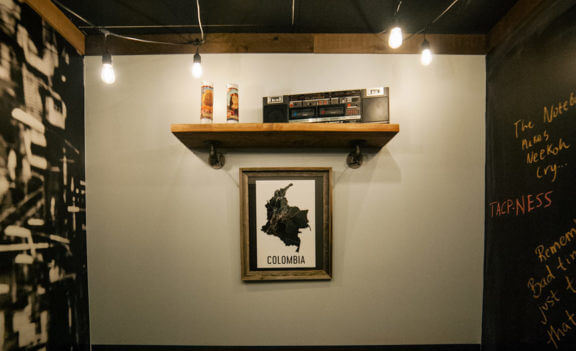
Velez tells us he left Jersey at 18 to begin his enlistment in the U.S. Army as a cook. “That’s when I really started getting my feet wet,” says Velez. “The army doesn’t let you be creative but they do inspect you daily. If you’re not following their recipes to a ‘T’, you get written up.”
After his commitment ended, Velez chose to continue his career path on the civilian side by attending culinary school at Pikes Peak Community College before starting his first job as a cook at The Rabbit Hole in downtown Colorado Springs.
Velez encourages us to order and it forces us to stop vacillating. Our eyes excitedly dart around the menu with numerous additions since the food truck days and we select their popular island tacos, served in a crunchy, blue corn shell. They don’t disappoint with a multitude of textures to keep our palate busy with acidity from the pineapple braised pork and lime, a rich jalapeno-habanero cilantro cream, strips of crunchy cabbage and creamy Cotija cheese. We continue our app-attack with risotto balls, a rich take on arancini with generous amounts of cheese in the center and salty, ham-like notes from the rice.
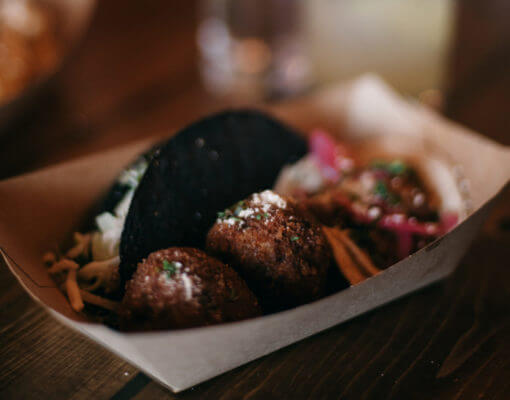
During our visit on a Thursday evening we notice how quickly the intimate space fills up with only standing room left around the modest number of tables and booths. As we sip on our drinks and take in the satiating starters we forget we are sitting in suburban Colorado. The bustling energy of the full dining room and vibrant artwork supplies all of our senses with an infectious, fresh vibe in a much-needed part of town.
We eat onwards with Caribbean nachos, a kimchi quesadilla and pollo fritos with another round of beverages that includes our favorites of the evening, the spicy margarita and a rum Old Fashioned.
The margarita offers the perfect pitch of heat and tang, and Velez says it’s their highest-selling drink on the menu. We understand why as it definitely ranks as one of the best tequila-based cocktails we’ve had anywhere locally.
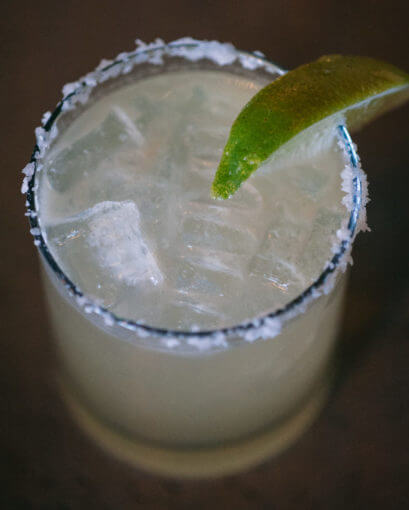
The Old Fashioned continues to raise the bar as a brighter version than the classic whiskey cocktail. It expresses a well-balanced ratio of sweet and bitter with a round mouthfeel derived from the rum.
The Caribbean nachos arrive with crisp, fried green plantains placed methodically around the paper basket mimicking the bowl-like structure and covered with a generous portion of citrus garlic pork, black beans, cabbage, crumbles of cotija cheese, a fragrant roasted garlic aioli, cilantro and lime.

The kimchi quesadilla discerns an Asian inclusion which Velez traces back to his wife’s Korean roots. He comments on how memorable his first time tasting the fermented veg was and calls the experience “mind-blowing.”
“It was like nothing I’d ever had before,” says Velez with a genuine pronunciation. “From that moment on I’ve enjoyed playing with Korean ingredients.”
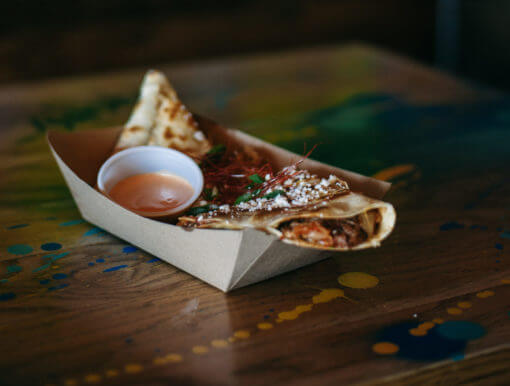
The pollo fritos also capture some Eastern appreciation but Velez says that can be more directly tied to his simplistic love of fried chicken. “I had to put it on the menu someway or another,” says Velez emphatically. The all dark meat poppers incorporates a Muenster cheese topping to pay homage to his friends and families preferences for the soft dairy plus an ample sauce made of Gochujang, soy sauce, garlic, sesame seeds and sugar that coats the breading and provides an approachable kick.
Velez takes a moment to request three shots of aguardiente or “fire water” (ardiente and agua), an anise-flavored liqueur derived from sugar cane, common in Colombia. Generally, the spirit ranges between 24 to 29 percent alcohol by volume and is traditionally enjoyed neat. We don’t rush the moment and take in the 1999 hit by Ol’ Dirty Bastard “Got Your Money” as we cheers, tap the table and knock it back. It’s surprisingly delicious and nothing like the hot, astringent liquid we readied ourselves for. It actually goes down a little too easy and we opt for another, fortifying the completion of our meal.
As a legitimate food coma sets in with realize there’s more than a fair amount of leftovers on the table to be spoken for and still somehow a dessert finds it’s way over. A Cuban pastelito, a dulce puff pastry with guava and cream cheese reminds us of an elevated, fluffy pop-tart. Traditional pastelitos come in many varieties (including savory) and are a common snack served in Miami cafes with coffee available at all hours of the day or night. Piglatin’s take is flaky with a gentle sweetness that hints towards cheesecake, a firm yet happy official conclusion to the broad expression of flavors we experience at Piglatin Cocina.
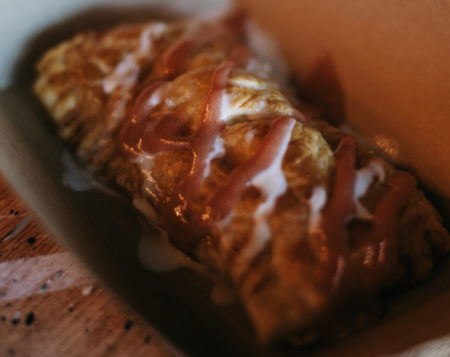
“There’s a culture of transplants here and they need something from home,” says Velez. “I want to fulfill those needs and that’s honestly why we exist, to provide that.”



